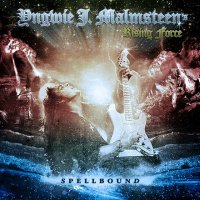
YNGWIE MALMSTEEN
Spellbound
![]()
Rising Force (2012)
Rating: 5/10

|
When you think of metal, the first thing that comes to mind is guitars. Big guitars; big, fast guitars drenched with distortion. The guitar hero is the icon of the heavy metal world, and few encompass that ethos as well as Yngwie J. Malmsteen.
Malmsteen debuted on the international scene in 1983 with both Steeler and Alcatrazz, and released his first solo album the following year, Rising Force. This album immediately established him as a guitar god. His neo-classical guitar riffs played at mind numbing speed were fresh and amazing. Yngwie Malmsteen was a force to be reckoned with.
Over the years Malmsteen has continued to hone his craft, offering albums packed with high octane instrumentals and classic metal riffs, burning through a number of vocalists and backing musicians in the process. Spellbound is a true solo album, in that Yngwie performs all instrument, vocal and production duties. This is an impressive feat that very few have been able to take on with any great amount of success. Does it work? It’s a mixed bag.
Spellbound is, overall, a good release that has hints of Malmsteen’s best work. The overt classical influences of the title track, and the driving metal rhythm of ‘Repent’ bring to mind his Trilogy (1986) release, which to the ears of this reviewer is one of Yngwie’s finest moments.
The blues sounds of ‘Let Sleeping Dogs Lie’ and ‘Iron Blues’ are excellent examples of the uniqueness of Malmsteen’s work. No-one else has been able to mix blues and classical sounds, channeling both Stevie Ray Vaughan and Paganini, and it has become a trademark of his work. In these ways Spellbound is exactly what a fan would want from an Yngwie J. Malmsteen release.
The problems come mostly in the area of production. Many of the songs can boast impressive backing instruments. Complex textures are created, however they are difficult to hear due to an annoyingly lead guitar heavy mix. ‘Repent’ is the first of three vocal performances on the album where Yngwie creates some impressive vocal harmonies that are difficult to hear, as they are drowned in guitar. Even the lead vocals are difficult to hear.
The next track, ‘Let Sleeping Dogs Lie’, suffers from a similar malady. Not only are the lead vocals hard to hear over the guitar pyrotechnics, but the bass and drums are difficult to make out as well. As a result the album sounds a bit like a demo created by a phenomenal guitarist rather than a complete album.
And now to the question everyone wants to ask: can Yngwie Malmsteen sing? Yes. Is he an incredible vocalist? No. Malmsteen has worked with some amazing singers in the past, particularly Joe Lynn Turner (ex-Rainbow), Ron Keel (Keel) and Mark Boals (ex-Royal Hunt), and the man himself is a competent vocalist. However, he lacks the power of those who have previously filled this position. This adds to the “demo” sound of Spellbound.
But what Malmsteen lacks in vocal prowess is more than made up for in guitar virtuosity. The full speed shredding of ‘Poisoned Mind’ and the nylon-stringed classical guitars of ‘Requiem For The Lost’ are awe-inducing. They are more than enough to make even seasoned professional guitarists stand in amazement.
Spellbound is neither a great nor terrible effort. The problem with primarily instrumental albums is the need to avoid repetition. Malmsteen’s high speed guitar sweeps are such a prevalent component of his style as to make many songs run together. This probably wouldn’t be the case if the mix allowed the structure of the songs to shine. By placing the guitars extremely high in the mix Yngwie Malmsteen has played to his strengths. But while I enjoyed Spellbound, I doubt it will join Trilogy or even Fire & Ice (1992) as my favourite releases from the guitar hero’s guitar hero.
Jim McDonald





